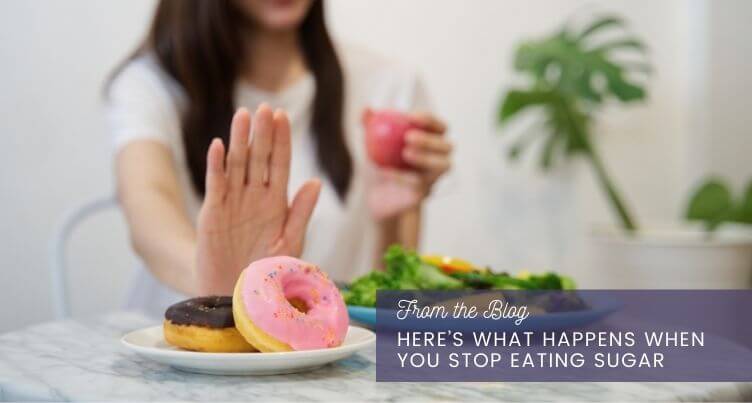
Here’s What Happens When You Stop Eating Sugar
Did you know it is recommended to consume under 100 calories of added sugar per day for women and just 150 calories of added sugar for men? Yet most of us are consuming far more than this-in fact-it shouldn’t surprise you to learn that it’s easy to consume triple this or more! And every day around the globe, people do exactly that.
If you find yourself dealing with mood swings, weight problems and feeling sluggish, too much sugar could be to blame.
One thing to consider trying is a sugar detox.
Here’s a look at what might happen to your body when you give up added sugar.
After One Hour
One hour after a sugary snack, the initial “sugar rush” should start to wear off and you’ll find yourself more energized, but you might have the urge to reach for a sweet or processed snack.
After Three Days
For some of us, sugar is an unrealized addiction. After a few days without it, you might find yourself craving it more than ever and even experiencing withdrawal symptoms including headaches, anxiety and mood swings. It’s critical to keep yourself properly hydrated during this time, which could last several days.
After One Week
If your diet before quitting added sugar was primarily dependent on sweetened sodas, juices and other processed snacks, you may still be feeling some moderate side effects as your body continues to detox. However, you should begin to feel less sluggish and may even find that your energy levels are increasing.
After One Month
Congratulations! You’ve made it one month without added sugar-you should be proud. By now, you’re probably feeling healthier than you had before. You’re likely finding cravings for sweets have subsided or are very limited. At this point, some people even notice they may begin craving protein or vegetables instead.
After One Year
After a full year without added sugar, your body should be adjusted to functioning on essential nutrients, so long as you’ve replaced sugar with healthy options! It should be no surprise that you might be feeling better than you have in years, and you may have even lost weight.
While giving up sugar completely isn’t for everyone, it’s important to at least monitor your intake. Looking for other nutritional tips? Ask us at your next appointment.

Jun 16, 2021 at 1:55 PM
Thanks for the reminder! Definitely more sugars have been consumed during the Pandemic! I will be doing a checkin with myself!
Jun 18, 2021 at 10:43 AM
Yes so true!!! Glad to hear you will be reassessing! We should all take that approach from time to time. Good for you!
Jun 16, 2021 at 5:36 PM
Can you give us a detailed list of foods that contain high levels of sugar? Everything I read on labels seems to be in grams so I'm not sure how to compare to your article in comparison to calories.
Jun 18, 2021 at 10:58 AM
Hi Cheryl, Thank you so much for your comment. That is a very good question! Yes grams is usually the way sugar is labeled. I find the very best way is to decipher the sugar question by looking at foods on the Glycmeic index and to also determine the Glycemic load. Even then unfortunately, you might find lists of foods that are different from one source to another. Your personal goals are important to consider and of course some recommendations may differ if there are any particular health concerns In general more green veggies is always a good start!